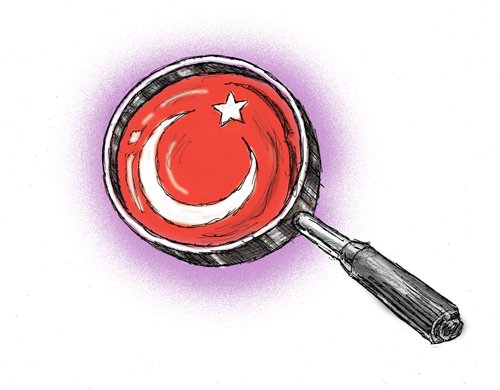
Illustration: Peter C. Espina/GT
In a statement full of prejudice and ignorance, Turkish Foreign Ministry spokesman Hami Aksoy on Saturday accused China of torturing and politically brainwashing the "Uyghur Turks" and other Muslim communities in "internment camps" in Xinjiang to "eliminate their ethnic, religious and cultural identities." He also claimed Abdurehim Heyit, a Uyghur poet and musician "who was sentenced to eight years in prison for his compositions," died during his second year of incarceration.
It must have been a slap in the face when Heyit appeared in a video on the Turkish language website of China Radio International on Sunday, saying he is "in the process of being investigated for allegedly violating national laws," and "in good health and have never been abused."
Controversies surrounding the Xinjiang vocational education and training centers, what the Western countries and media have called "re-education camps," have been swirling in recent months. But as diplomats from 12 countries with large Muslim populations and foreign media invited to Xinjiang have seen, the facilities are useful for anti-terrorism and counter-extremism efforts. Those held at the training centers had been brainwashed by extremism or committed misdemeanors. They learn Putonghua, China's national language, and are educated on the country's laws while developing job skills that will help them reintegrate into society.
Turkish journalist Erdal Kuruçay from pro-government channel ATV said after visiting one of the centers that his prejudices were shattered. Kuruçay discovered the mistakes Western media were making - the center is not a "re-education camp," but a "therapy center" for criminals.
Instead of making irresponsible accusations based on hearsay, shouldn't Turkish officials listen to what their country's reporter said and experienced? Why does Ankara not believe its own reporter?
Turkey has faced its own internal and external difficulties. Domestically, the country has been hit by economic woes and terrorist threats. Externally, after a failed coup in 2016, Western relations quickly soured and its dream to join the world's biggest trading bloc, the European Union, a decades-long goal Ankara has strived for, is practically dead.
Turkish President Recep Tayyip Erdogan is reshaping the country by placing religion at the heart of national life after decades of secular dominance and wants to position his nation as "the only country that can lead the Muslim world."
However, pointing an accusatory finger at China's treatment of its Muslim ethnic Uyghurs in Xinjiang won't add to Ankara's credentials as a leader for the world's estimated 1.8 billion Muslims.
The accusations are groundless due to Turkey's lack of understanding of the Xinjiang issue. Over the years, a large number of Xinjiang separatists have found shield in Turkey.
It's estimated that Turkey is home to nearly 20 active Xinjiang separatist organizations. The East Turkestan Islamic Movement, a decades-old Uyghur separatist group, has long used Turkey as a shield.
For historical, cultural and religious reasons, some Turkish citizens have even shown sympathy for the Xinjiang separatists. Their information on what has happened in China, especially in Xinjiang, has come mainly from the separatists living in their country and Western media, so their understanding of the issues is biased.
The ongoing counter-extremism efforts in Xinjiang are aimed at rooting out terrorism at its source, rather than a suppression of religious freedom and human rights violations.
All ethnic groups in Xinjiang enjoy the freedom of religion in accordance with the law. The Chinese Embassy in Ankara said Xinjiang is home to 24,400 mosques and 13 million Muslims, with 530 per mosque on average, while in Turkey, there are roughly 82 million Muslims and 90,000 mosques, with 910 per mosque on average.
Since the education and training centers were established in Xinjiang, regional security has improved. In this sense, the basic human rights of the Xinjiang people - the right to life, has been well-protected.
As Turkey continues to look Eastward amid strained relations with the West, China's peaceful rise and its Belt and Road initiative both provide Turkey an opportunity for healthy development. Turkey would be much better off if it focused on its strategic partnership with China while trying to gain realistic understanding of the Xinjiang issue, avoiding its Muslim leadership aspirations being misused.
The author is a reporter with the Global Times. opinion@globaltimes.com.cn

